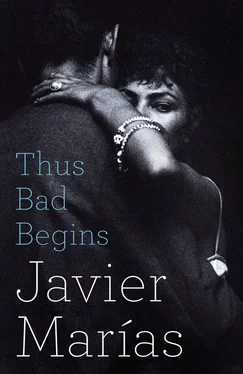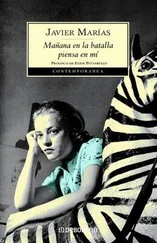These ‘private parties’ — which took place on Muriel’s birthday and saint’s day, or were impromptu affairs put on to entertain a visitor or celebrate some promising bit of news when it was still little more than a promise — usually had a fairly fixed guest list, with others being added as and when. Regulars on that list were Rico and Roy, whom Muriel, on my first night as a spy, had accused of having carnal relations with his despised wife, an accusation she had brushed aside. Rico was Professor Francisco Rico, who, although far more famous now than he was then, was nevertheless pretty well known; he was not yet forty, but already had a veritable library behind him (by which I mean books that he himself had written or created), and enjoyed a brilliant career as scholar, expert, righter of literary wrongs, luminary, highbrow, perfect pedant (for he made of his pedantry an art), professional schemer and, of course, eminent and much-feared teacher (he was probably already a professor when I met him; in fact, given his astonishing precociousness in all things, he had probably been a professor since puberty). He lived and taught in Barcelona and its environs, but travelled widely within Europe in order to scheme and plot (the Americas did not attract him, because it was a continent with no Middle Ages and no Renaissance) and he often came to Madrid to engage in murky and disastrous dealings (God had not called him to the path he insisted on travelling), to establish diplomatic relations with the various circles he had access to, including the world of politics, and to work on his candidature to the Real Academia Española, a body he probably despised deep down, but which he nonetheless wished to enter. He was clearly only prepared to remain outside those bodies where membership depended not on others, but solely on himself, just as he could happily leave behind him those places where the doors had already been flung wide to him and where, if possible, he was being begged to cross the threshold. Needless to say, he also came for his own amusement, and there was no doubting the affection bordering on adoration that he felt for Muriel. He clearly enjoyed Muriel’s company enormously and admired him too, perhaps not so much for his films — Rico did not care for the cinema, an art invented far too late and in what, for him, was a hideously decadent century — but for his personality and because of an affinity of character that meant they sparked each other off and generally got on like a house on fire: they both, each in his own way, tended to be arrogant and disrespectful and had a sharp sense of humour that not everyone understood. Such was the Professor’s veneration for Muriel that he pretty much extended it to everyone who surrounded him, as if their nearness to and acceptance of the maestro in itself gave them value, and it seemed to me that it was for this reason — at least in principle — that he acted as chevalier servant to Beatriz Noguera and, whenever he was in Madrid, often accompanied her to the theatre, to a museum, a concert or even shopping. He was a salacious fellow, as was clear from the overeager look on his face, although he was oblivious both to this and to the fact that women find such eagerness either a complete turn-off or rather attractive — there’s no halfway house — but I nevertheless believe that, regardless of the state of the Muriel marriage, the enormous respect and affection he felt for Muriel would have prevented him from getting close to his wife in any capacity other than that of companion, friend and helpmate, as an extreme gesture of deference towards Muriel with Beatriz as intermediary. It was quite likely that Rico and Beatriz also got on well and had developed their own estimable friendship; it was equally possible that the Professor’s eyes did occasionally linger on her opulent figure (he was a man who, like me and despite the difference in our ages, appreciated flesh and detested bone), or that their fingers might accidentally have touched when she was trying on a dress in a shop and invited him to feel the fabric, or that he had placed a hand on her shoulder, arm or waist to protect her from the speeding cars as she was about to cross the street, but nothing more than that, at least in my opinion. And Beatriz was three or four years older than him, enough for her to treat any suggestion or advance on his part with a certain irony, if she preferred not to take him up on them, but play them down and let them pass.
Rico’s salacious nature — or, perhaps, his strong sexuality — was evident in his soft, flexible mouth permanently occupied by a cigarette, in his oblique gaze hidden behind rather large spectacles that made him seem diligent and innocuous — but only when you first met him — it was there even in his prematurely bald head, which he carried with a poise and an aplomb unusual in those who go bald before their time, and which can often be a cause of complexes or even a kind of universal resentment, whereas he was all loquacity, good cheer and remarkable sans-façon , as if he were a Don Juan or a handsome, dashing fellow adorned with a fascinating toupee that women find magnetically attractive (his bald head was, in fact, like a battering ram, make of that what you will). Once, at Muriel’s apartment, he had the temerity to flirt in my presence with a girl I was going out with at the time — well, I was going out with several girls, and they, of course, as was normal among people our age, were going out with several other men — and who had come to pick me up at the end of my working day. His main method of attack always consisted in trying to impress whoever it was with his encyclopaedic knowledge, and this sometimes led him to misjudge his audience: to most twenty-one-year-old women — apart from a few rare exceptions brimming with curiosity — his excessive display of learning, in this case on the origin of my surname, would have seemed either boring or alarming or quite frankly bewildering.
‘Come over here, young De Vere.’ That’s how I was sometimes addressed both by Muriel and his followers, although the latter did so merely by imitation or perhaps impregnation. Professor Rico always treated me kindly and benevolently because of my closeness to Muriel, but also somewhat dismissively because of my youth, he was, after all, fifteen years older than me and I was more or less the same age as his students, whom he took great pleasure in humorously despising, humiliating and terrorizing, although his victims seemed not to notice, thus demonstrating, according to him, their sad lack of little grey cells or nous (he loved to mix high-flown language with slang or sometimes even genuinely crude expressions, just so that we wouldn’t think he lived entirely in the limbo of centuries past). It was the same, indeed, with his teaching assistants, with most of his colleagues or supposed peers and almost every other being under the sun; generally speaking, any contemporary of his merited little respect and was, by definition, deemed to be defective. I imagine that he himself regretted being his own contemporary as well as that of all the many ignoramuses and idiots who criss-crossed the world, happily bellowing forth their blatant idiocy, as he once put it. I still see him from time to time, and, as is only natural, his distaste has only increased with the passing decades. ‘Sit down for a moment, young De Vere, I need to question you. And bring your friend too, or were you hoping to smuggle her past me? Introduce us.’ She was called or called herself Bettina and worked nights in a bar, which is where I had met her; she was a cheerful, quick-witted girl and wore short skirts, well, not so very short, but they did prove pretty spectacular when she sat down, a fact doubtless anticipated by the Professor as soon as his swift eye saw her standing there. ‘De Vere, now what kind of a surname is that?’ And he pulled a sceptical face. ‘It’s not hard to pronounce nor does it look particularly odd when written down, but it is very un-Spanish, if it is Spanish at all. No, no, it’s French in origin.’ And he said my name with a French accent and repeated it, stressing the guttural ‘r’. ‘But the most famous De Veres are to be found in England, as far as I know, and I do, of course, know all there is to know, where the name is pronounced De Viah, De Viah.’ He liked the sound of his own voice, and he pronounced my name this time very affectedly and with a more or less English accent; he was admirable really, he never had the slightest fear of making a fool of himself, indeed, he never did, however close to the edge he trod; he didn’t care who he was talking to or who was listening, whether addressing a congregation of international luminaries or a young woman he didn’t even know, he always felt he was the dominant, superior party (except when he was with Muriel). ‘It’s the family name of the earls of Oxford, and dates back to the reign of William the Conqueror — in the eleventh century, just in case you didn’t know, nowadays, one can never assume that people know even the most basic of facts.’ I did know, as it happened, having studied English history at university, but I wasn’t going to interrupt him. ‘Not so long ago, I had a student who was convinced that the French Revolution was a rebellion against Napoleon. I mean, for fuck’s sake, ça suffit ,’ he added in French. Sometimes, by way of a preamble or conclusion, Rico would utter strange, unintelligible onomatopoeia (if one can call them that) of his own invention, perhaps as a way of avoiding the usual filler words like ‘Well’, ‘So’ and ‘Anyway’, which he must have thought vulgar. ‘ Svástire ,’ he said, or I think he did, then went on: ‘The oldest recorded De Vere, I seem to recall — and if I seem to recall it, it must be true — was named Aubrey, which is neither more nor less than a distorted version of Albericus (how’s that for a bit of unexpected Latin), a Christian name that has recurred several times throughout the family history. There has also been a Robert, a Francis, a Horace and a few Johns, which means that you share the same name as — or have copied it from — a couple of far nobler subjects from an earlier age.’ He was speaking to me, but was sitting half-turned towards Bettina and kept shooting sideways glances at her thighs or perhaps higher up than that; she had not crossed her legs, and so her brief, tight skirt allowed one to discern something in between them; the crotch of her knickers, I suppose, although she, like so many of her contemporaries, did not always wear knickers: it was all part and parcel of that liberated age and of a consequent desire to provoke. She noticed these myopic glances and allowed herself to be looked at; she appeared to be listening to Rico with close attention, although it could equally well have been amazement. ‘More than that, I have an Anglo-Saxon colleague who is just beginning to maintain, secretly until he has published his study (it won’t be worth a button, but that’s his lookout), that the corpus of texts we believe to have been written by William Shakespeare’ — that’s what he said, ‘corpus of texts’ — ‘was in fact written by a De Vere.’ Pleased with his phonetic skills, he again pronounced this as ‘De Viah’, with great delight and exaggeration, it sounded almost like an insult or as if he were retching. ‘Edward, the seventeenth Earl of Oxford, Lord Great Chamberlain, ambassador, a wild, quarrelsome individual, not without talent: soldier, duellist, poet, failed plotter against Sidney and the person responsible for introducing into Elizabeth I’s court the perfumed, embroidered glove. You probably haven’t a clue who Sidney was, but never mind, now you do,’ and he paused for a second. This was entirely untrue, because how could we know who Sidney was from the mere mention of his name? I was also confused by that mention of a glove, but perhaps he hadn’t just slipped it in by chance, maybe it was a way of drawing us in.
Читать дальше












